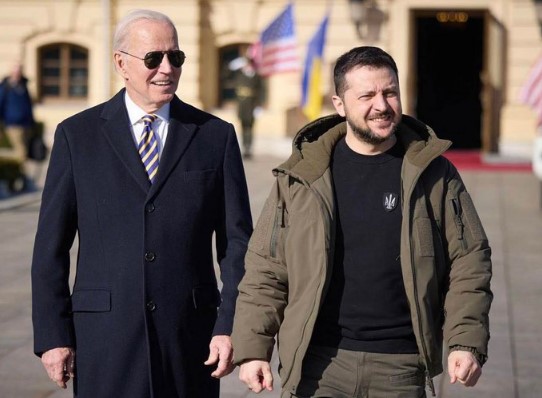
Exactly 12 months ago today, Russian tanks rolled across the border into Ukraine. The anniversary of that event has not gone unnoticed. Indeed, it has occupied many hours of time on television and as many columns in the pages of the press.
Both the President of the Russian Federation and that of the United States of America delivered long speeches on the same subject, although, to judge by the content, they might as well have been speaking about quite different events taking place in a distant galaxy.
In his State of the Union speech, Putin stated that the war in Ukraine was caused by the deliberate action of US imperialism. This claim was indignantly denied by the western media, which continued to repeat the idea that this was “Putin’s war” – a war caused by the megalomaniacal tendencies – or actual insanity – of the man in the Kremlin.
Replying to the Russian President, Joe Biden assured a multitudinous audience of adoring fans in Warsaw that NATO was not the aggressor, that it was an entirely innocent, peace-loving assembly of noble-hearted lovers of democracy that never threatened anyone.
“We have nothing against the people of Russia,” he reassured the Poles. We pose no more of a threat to them than would a group of boy scouts who come knocking at your door offering to clean your windows. And so on and so forth in this vein.
Insofar as this lovable assortment of pacifistic boy scouts are armed to the teeth with every imaginable weapon of mass destruction known to humankind, this is, of course, purely for the purpose of self-defence. For the world, as we know, is full of bad guys who are always threatening to overthrow our democratic way of life.
A truly heart-warming speech that will have served to soothe the jangling nerves of Biden’s Polish friends. But before we allow ourselves to be lulled into a deep sleep, let us subject the facts to a calm and rational examination.
The information war
In any war, the ruling class must take all the necessary steps to mobilise public opinion to support its actions. It is therefore a matter of extreme importance to invent a whole battery of arguments that serve to unite the masses behind the war chariot, to convince them, by all sorts of lies and trickery, that ‘we are the injured party,’ and that ‘truth and justice are on our side’ (as well as God, who, by some miracle, is always on the side of every conflicting army).
To this end, it is always necessary to prove that the war was started by the other side. This is not so difficult to do, for if no incident occurs to justify such a claim, it can always be manufactured. And the ruling class has in its hands a vast and powerful machine for propaganda, which is immediately mobilised for that purpose.
As a matter of fact, the question of who fired the first shot, who invaded whom etc. is a trivial one, which tells us absolutely nothing about the real causes and content of the conflict.
All these points apply to the present information war, which in the present conflict differs from its predecessors only in the vastness of its scope and the brazenness of its lies. Needless to say, the actual reasons a war is waged are never mentioned.
‘Putin’s war’
For the past 12 months, with tedious monotony, day in and day out, the same message has been repeated by our “free press”. “This is Putin’s war”. The man in the Kremlin is portrayed alternately as a bloodthirsty tyrant with aspirations to rule the world or a man of unbalanced mind, prey to megalomaniacal delusions with whom a psychiatrist could spend a happy half hour in deep conversation. An unhinged “lunatic”, to quote the elegant language of the British defence secretary, Ben Wallace.
But neither of these comforting descriptions can fit the bill. The same man was previously described as a cunning Machiavellian schemer who, from the rank of a humble KGB operator, succeeded in a short time in raising himself to the head of one of the world’s most powerful states.
Can one really believe that such a man would throw all caution to the wind and stake everything on a desperate gambler’s throw? That would not at all be in character. Nor is there the slightest evidence to support the hypothesis that Vladimir Putin is clinically insane. That label would be far more fairly applied to some of the ladies and gentlemen who at present hold the highest office in the land of the United Kingdom of Great Britain, including Mr. Ben Wallace. But we will speak on that subject some other time.
Does Putin want to restore the Soviet Union?
It is also alleged that Putin wishes to restore the Russian Empire, or even the USSR. We can immediately dismiss the second variant as devoid of all real content. The Soviet Union was what we would call a bureaucratically deformed workers’ state.
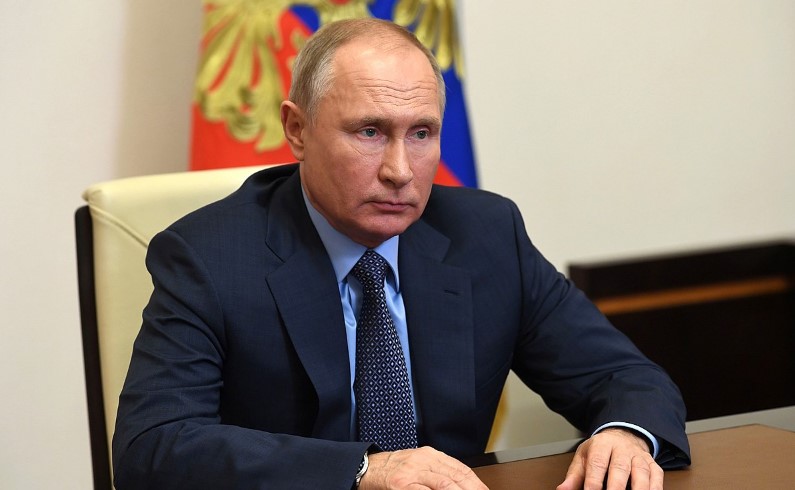
Despite the degeneration that it suffered under Stalin, it still retained many of the most important gains of the October Revolution, namely, a nationalised planned economy.
The fall of the Soviet Union, brought about by decades of corruption, swindling. mismanagement and bureaucratic bungling by a privileged caste of officials, led to the complete dismantling of the planned economy and the liquidation of all that remained of the former workers’ state.
In its place, what we now have in Russia is a capitalist state in which the means of production are owned and controlled by an oligarchy that is 100 times more corrupt and rotten than the Stalinist bureaucracy ever was.
There are foolish old Stalinists who live in their dreams, and imagine that Putin is somehow the man who will restore the glory of the Soviet Union. That is utter nonsense. Vladimir Putin is the child of the counter-revolutionary, capitalist regime that arose from the wreckage of the Soviet Union, and he stands for the defence of its interests. In the process he has become fabulously rich.
Putin is a reactionary bourgeois Bonapartist, whose policies cannot play a progressive role, either in domestic or in foreign policy, either in peace or in war. Any confusion on this question will lead to the most negative results.
It is true that Putin once called the collapse of the Soviet Union: “the greatest geopolitical catastrophe of the 20th century”. But he also said: “Anyone who does not regret [its] destruction has no heart; anyone who wants to see it recreated has no brain.”
I would not say that those who assiduously spread the fairytale of Putin’s secret plan to restore the Soviet Union have no brain. They certainly have enough brains to peddle a story that is baseless, yet can deliver excellent results for NATO. And, after all, why let the facts spoil a good story?
The notion that he would like to restore the old, reactionary Tsarist Empire is slightly more credible, but is also based on the flimsiest and most stupid assumptions. A passing reference to Peter the Great is adduced as ‘proof’ for this theory.
This outlandish theory has been used to provoke an attack of nerves, not just in the Baltic states and Poland, but also in Finland and Sweden. “Ukraine was just a first step”, a former Swedish minister hinted darkly to The Guardian, “I wouldn’t be surprised if, in a few years, Estonia and Latvia are next in line.”
The neutral Swedes and Finns lost no time in jumping into bed with NATO. It was really no surprise. The so-called pacifism of the Nordic bourgeoisie was always a hypocritical façade, behind which lay concealed the most cynical self-interest.
It is true that Sweden remained neutral in both world wars. But it is equally true that Sweden derived vast profits from selling war materials to both sides, and grew fat on the proceeds of that blood money. Scratch a Scandinavian pacifist and you will find a frustrated imperialist not far beneath the surface.
The idea that Vladimir Putin’s actions are motivated by some grand design to restore the Tsarist Empire does not correspond in the slightest degree to all that we know about the man. It seeks to attribute to him a level of delusional historical romanticism that hardly sits well with what we know of his psychological profile.
This is not at all that of a dreamer with romantic visions of either the past or the future, but rather the cold, patient and calculating mindset of an ambitious professional bureaucrat; a man who had spent his entire adult life patiently climbing the slippery ladder, rung by rung, which leads in the direction of power.
The Guardian drew the correct conclusion from this nonsense when it wrote:
“Leaving aside the fact that the Russian military is already hard-pressed to achieve even modest successes in Ukraine, an attack on the Baltic states or Poland would bring them into direct conflict with NATO, which is the last thing that Moscow (or the west) wants.” (The Guardian, 22 Aug 2022)
Russia’s declared aims were still quite moderate: basically, to prevent Ukraine from joining NATO and to neutralise the regime in Kyiv. Could the West have accepted this? Of course, they could have! They themselves had continually postponed Ukraine’s membership, not just of NATO but even of the EU.
For many years, they had accepted a neutral role for Finland. Why could Ukraine not be in a similar position? From their own point of view, there would be many advantages in maintaining friendly relations with Russia and the West. If they did not accept it, there must have been reasons. And there were very sound reasons.
An aggressive imperialist alliance
NATO is not a peace-loving organisation whose aim is solely the defence of western democratic values. It is, in fact, an aggressive imperialist alliance that exists exclusively as a cover for the ambitions of its paymaster, the United States, and its aim of total world domination.
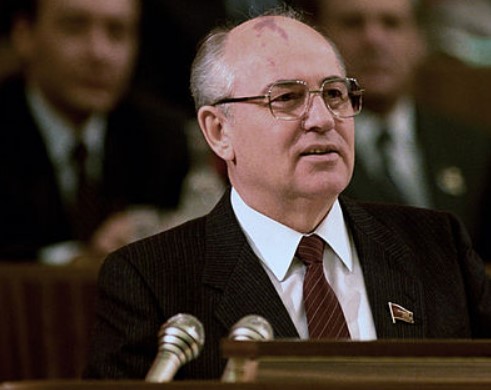
In the 1980s, when the crisis of the Soviet Union forced it to seek accommodation with US imperialism, the then-Soviet leader Mikhail Gorbachev only accepted German reunification – over which the Soviet Union had a legal right of veto – because he received assurances that NATO would not expand after he withdrew his forces from Eastern Europe.
The leaders of the USA, Britain and Germany gave cast-iron assurances that Russia’s legitimate security concerns would be respected on this point. George H. W. Bush’s secretary of state, James Baker, assured his Soviet counterpart, Eduard Shevardnadze, that in a post-Cold War Europe, NATO would no longer be belligerent – “less of a military organization, much more of a political one, [so it would] have no need for independent capability”. Or so they said.
Baker further promised Shevardnadze “iron-clad guarantees that NATO’s jurisdiction or forces would not move eastward”. On the same day, in Moscow, he famously told the Soviet General Secretary that the alliance would not move “one inch to the east”.
He lied. The promises not to expand NATO only lasted until 1999, when Poland, the Czech Republic and Hungary were invited into the alliance. In total, 13 Eastern European states have become NATO members since then.
And this peace-loving upholder of democracy and the sovereign rights of nation states pursued its aggressive aims with the utmost vigour and brutality. US imperialism possesses the most powerful military machine in the world. It made use of this power to invade and crush any states that it could not control.
After the collapse of the USSR, the Americans took advantage of the chaos of the Yeltsin years to assert their domination on a world scale. They intervened in areas formerly dominated by Russia, which they would never have dared to do in Soviet times.
First, they intervened in the Balkans, deliberately accelerating the breakup of the former Yugoslavia. They bombed Serbia and interfered in its internal affairs in order to install a pro-western government. This was followed by the criminal invasions of Iraq and Afghanistan, and an unsuccessful intervention in the Syrian civil war, which brought them into collision with Russia.
All the time, they continued to expand their grip on Eastern Europe, expanding NATO by including former Soviet satellites like Poland and the Baltic States. So much for the promises repeatedly made by the West that NATO would not expand “one inch” to the east.
This brought a hostile military alliance to the very frontiers of the Russian Federation. US imperialism makes use of many different methods to pursue its aim of world domination.
The argument about national sovereignty, which is now so often used to brand Russia as an aggressor in the case of Ukraine, was conveniently ignored in the cases of Serbia, Afghanistan and Iraq.
These were supposed to be sovereign independent states. But that made no difference whatsoever to US imperialism, which shamelessly violated their sovereignty and bombed and crushed them without mercy.
Russia and the USA
Russia is more than just a regional imperialist power. Its possession of huge reserves of oil, gas and other raw materials; its strong industrial base and military-industrial complex; along with its powerful army and possession of a nuclear arsenal, all combine to give it a global reach that brings it into collision with US imperialism.
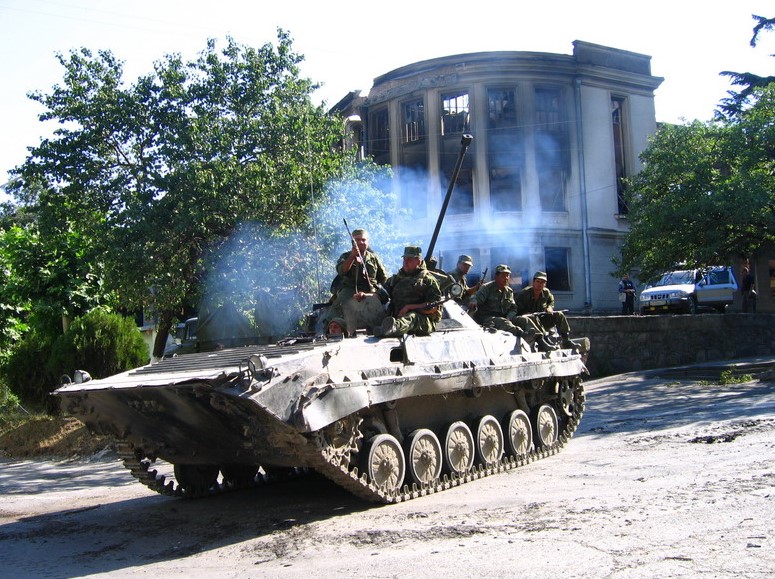
Washington sees Russia as a threat to its global interests, especially in Europe. The old hatred and suspicion of the Soviet Union did not disappear with the collapse of the USSR. Joe Biden is a prime example of the generation of Russophobes left over from the years of the Cold War.
Washington has a very large variety of weapons in its counter-revolutionary armoury. It uses its vast wealth to meddle in the internal affairs of other countries, blatantly financing and supporting opposition parties, rigging elections and toppling any government that is not to their liking.
So-called “colour revolutions” from 2003 onwards, brought about what is known as regime change to former Soviet bloc states, thus surrounding Russia with a growing number of states run by governments that were dominated by Washington and hostile to Russia.
But in attempting to draw Georgia into the orbit of NATO, they crossed a red line. Russia felt humiliated and threatened, and used military force to bring the Georgians back into line. The military defeat of the reactionary clique in Tbilisi was meant to show the Americans that Russia was flexing its muscles and pushing back at US imperialism and NATO.
That was a warning to America. But it continued its aggressive policy regardless. And matters reached the tipping point when they attempted to draw Ukraine into the western orbit.
‘The brightest of all red lines’
Western politicians dismiss the Russian’s objections as paranoid. They describe NATO as a purely ‘defensive’ alliance.
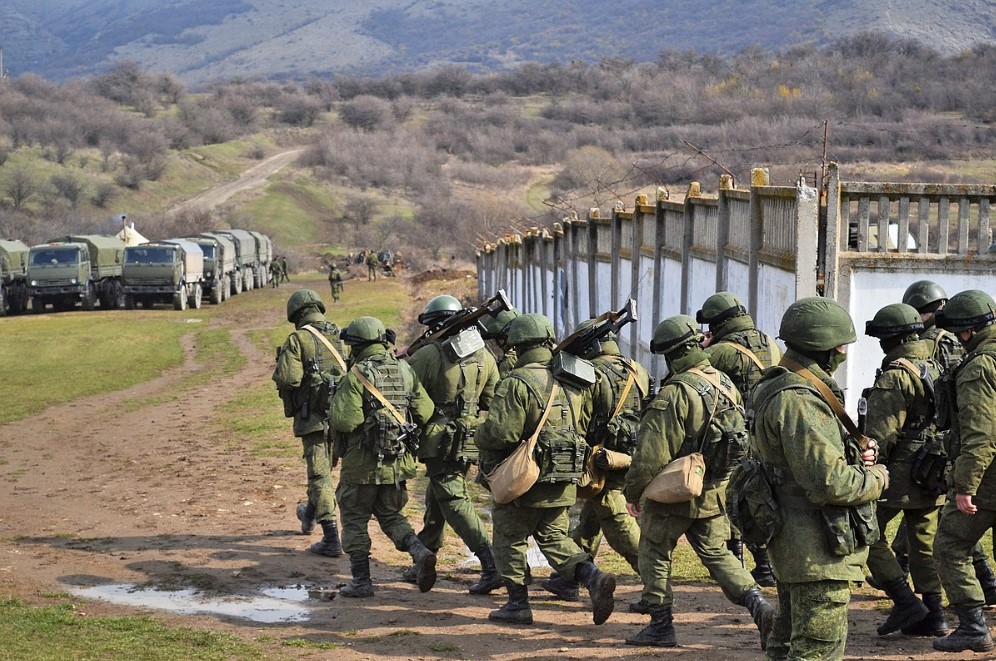
They claim that Russia’s decision to go to war was an act of “unprovoked aggression”. It was no such thing. The placing of a NATO member on Russia’s doorstep was a very clear act of unprovoked aggression and a provocation of the most blatant and brazen kind. Moscow could never accept it. This fact was well known to the Americans, who had been warned well in advance how Russia would respond.
When the possibility was raised at a NATO summit in 2008, that Ukraine should join the alliance as a full member, Bill Burns, (now the head of the CIA, who was then the US ambassador to Moscow) wrote in a secret cable to the White House: “Ukrainian entry into NATO is the brightest of all red lines for the Russian elite (not just Putin).”
And he added: “In my more than two-and-a-half years of conversations with key Russian players, from knuckle-draggers in the dark recesses of the Kremlin to Putin’s sharpest liberal critics, I have yet to find anyone who views Ukraine in NATO as anything other than a direct challenge to Russia’s interests… Today’s Russia will respond.”
The Americans had forced Putin into a corner and compelled him to react. Putin did respond. In 2014, he annexed Crimea. This occurred with virtually no resistance. That was because it had the support of the overwhelming majority of its population, who identify themselves as Russian. This fact is never mentioned in the western ‘free press’.
The vicious anti-Russian policies pursued by the reactionary nationalist clique in Kyiv also provoked a separatist revolt in the Donbas. Later, Russia intervened as the rebels faced a savage onslaught by the Ukrainian forces. That was the beginning of a war which, in reality, has continued, with greater or lesser intensity, ever since.
The farce of Minsk
The war in the Donbas, which started in 2014, was almost completely ignored by the western media. But the Russian-speaking population of that region was subjected to a merciless bombardment by the openly fascist Azov division ever since then.
The total number of deaths in Donbass to 31 December 2021 was estimated to be over 14,000, including non-combat military deaths. Most of the deaths took place in the first two years of the war between 2014 and 2015, when major combat took place before the Minsk agreements. All of this has been met with a wall of silence in the west.
The Minsk agreements were supposed to manage the Ukraine crisis and avoid escalating the conflict. But that was yet another lie. As The New York Post pointed out, Putin felt betrayed by the West: “It has turned out that no one was going to implement the agreements,” he complained. And this was indeed the case.
The West had not the slightest intention of carrying out the decisions. Former German Chancellor Angela Merkel has admittedthat the Minsk agreement was just a cynical trick. “The 2014 Minsk agreement was an attempt to give Ukraine time,” she told the weekly Die Zeit. “It also used this time to become stronger, as you can see today.”
And yet, these same ladies and gentlemen accuse Russia of being the main impediment to peace and stability in Ukraine.
The ‘defend democracy’ argument
President Biden said his visit to Kyiv would “reaffirm our unwavering and unflagging commitment to Ukraine’s democracy, sovereignty, and territorial integrity”. That makes three blatant lies in a single sentence, which is not a bad result, even by the impressive standards of an American President.
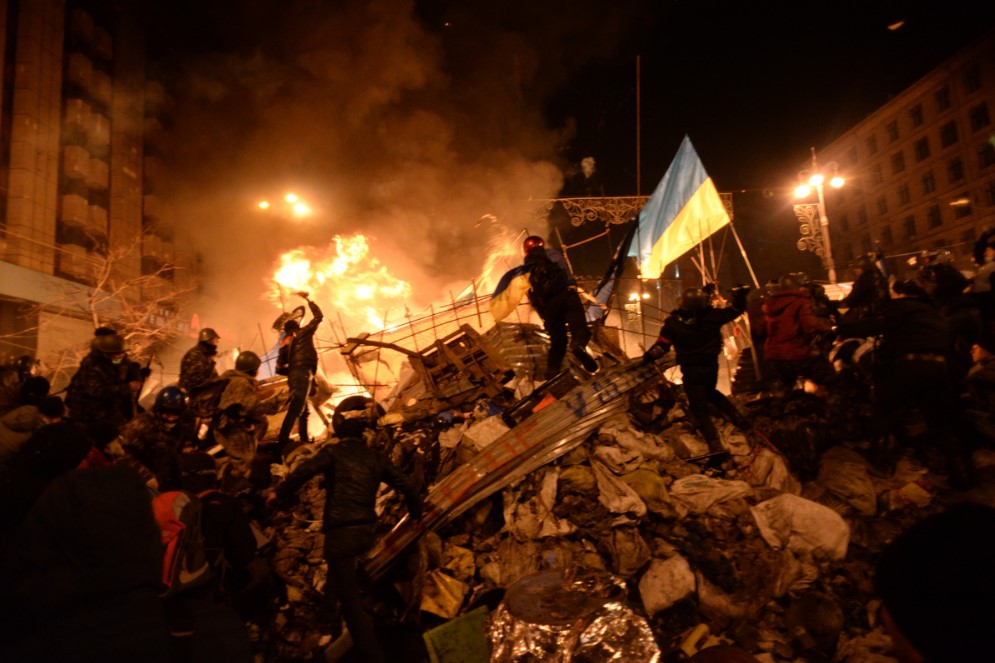
The argument that the West is “defending democracy” in Ukraine is equally false and hypocritical. The EU has long refused Ukraine’s entry on the grounds that it suffers what they call a “democratic deficit”.
The Guardian reported that: “Ukraine’s attractions as a model are limited. It is deeply corrupt, the rule of law is non-existent and its billionaire oligarchs wield disproportionate power.”
Opposition parties are routinely suppressed and persecuted. The press is muzzled by strict censorship. Far-right and openly fascist organisations have been incorporated into the state apparatus and armed forces.
The Communist Party had already been barred from standing in elections, and Communist symbols were banned after the 2014 EuroMaidan coup. Meanwhile, any criticism of the Ukrainian nationalist organisations which collaborated with the Nazis during WWII and carried out ethnic cleansing of Jews and Poles, has been outlawed, as they are considered “freedom fighters”.
With the start of the war a year ago, a whole series of other parties were also banned. Newspapers and TV stations have been closed down. Censorship and anti-democratic measures affect not only those who oppose the official brand of reactionary Ukrainian nationalism, but also bourgeois nationalist opponents of Zelensky.
In reality, issues like democracy, human rights and national sovereignty are of not the slightest interest to the American imperialists, except as cheap propaganda points. They have always been prepared to back the most bloody and repressive regimes, from the murderous Pinochet dictatorship in Chile to the blood-soaked regime of Saudi Arabia.
The reason they are interested in prolonging the war, irrespective of all the human suffering, has nothing to do with defending democracy or any other high-sounding moral cause. It corresponds to the cynical aim of weakening Russia, and thus serves their interests as the dominant world power.
‘Politics by other means’
Clausewitz said war is only the continuation of politics by other means. In order to have a clear idea of the issues involved and how they could play out, it is necessary to concentrate our attention on the fundamental processes, and not be distracted by the noisy information war, or by the inevitable vicissitudes on the battlefield.
The most important point is that this is a proxy war between Russia and US imperialism. Russia is not fighting a Ukrainian army but a NATO army – that is to say, the army of a state that is not formally a member of that alliance, but which is financed, armed, trained and equipped by NATO, which also provides it with logistical support and vital information.
The present war will end when the political ends of the key players are satisfied or when one or both sides are exhausted and lose the will to continue fighting. What are these goals? The war aims of Zelensky are no secret. He will, he says, settle for nothing less than the complete expulsion of the Russian army from all Ukrainian lands – including Crimea.
This standpoint has been enthusiastically supported by the hawks in the western coalition: the Poles, the Swedes and the leaders of the Baltic States – who have their own interests in mind – and, of course, the wooden-headed chauvinists and warmongers in London, who imagine that Britain, even in its present state of economic, political and moral bankruptcy, is still a major world power.
These ladies and gentlemen have been pushing the Ukrainians to continue fighting until the ‘final victory’. Their most ardent desire is to see the Ukrainian army driving the Russians, not just from Donbas but also from Crimea, provoking (they hope) the overthrow of Putin and the total defeat and the complete dismemberment of the Russian Federation (though they do not often speak of this in public).
They make a lot of noise, however, no serious person pays the slightest attention to the antics of the politicians in London, Warsaw and Vilnius. As leaders of second-rate states that lack any real weight in the scales of international politics, they remain second-rate actors who can never play more than a minor supporting role in this great drama.
It is the USA that pays the bills and dictates everything that happens. And at least the more sober-minded strategists of US imperialism know that all this delirium is just so much hot air. Under certain conditions, smaller imperialist states can play a certain role in the unfolding of events, but in the last analysis it is Washington that decides. But its policies have met with serious problems.
Sanctions have failed
Mark Twain once famously remarked: “Reports of my death are greatly exaggerated”. The same is true of the numerous reports in the western ‘free press’ of the alleged collapse of the Russian economy.
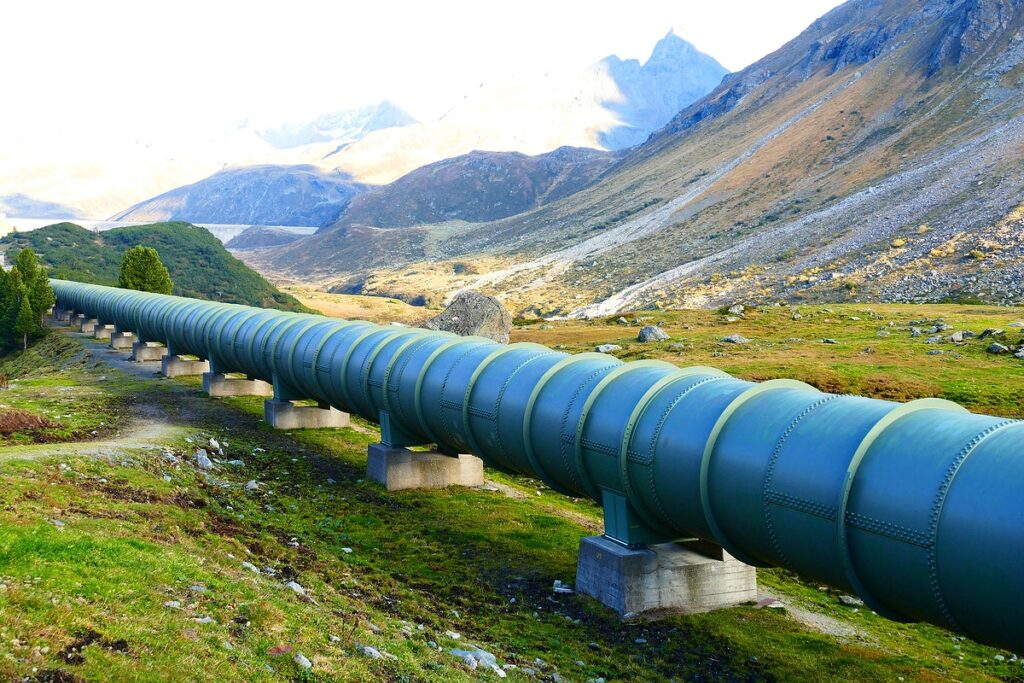
The sanctions imposed on Russia after it invaded Ukraine have been a spectacular failure. In fact, the value of Russian exports actually grew since the start of the war. Although the volume of Russia’s imports plunged as a result of sanctions, a number of countries (China, India, Turkey; but also some which are part of the EU, like Belgium, Spain and the Netherlands) have increased their trade with Russia.
Moreover, the high prices of oil and gas have offset revenue that Russia lost to sanctions. India and China have been buying much more of its crude, albeit at a discounted rate. Thus, the lost income resulting from sanctions has been compensated by the rising price of oil and gas on world markets.
Vladimir Putin continues to finance his armies with the proceeds, while the West is faced with the prospect of energy instability over the coming years, with soaring energy bills and rising public anger.
Support weakening
The question is: which side will tire of the war first? It is clear that time is not on the side of Ukraine, either from a military or a political point of view. And in the final analysis, the latter will weigh most heavily on the scales.
Europe has been hit by a serious shortage of gas and electricity, which is weakening public support for the war in Ukraine. Warmer weather than usual has brought a partial and temporary respite, but every month sanctions continue, the problems will grow.
American support also cannot be taken for granted. In public, the American ruling class are keeping up the idea of their unshakable support for Ukraine, but in private, they are not at all convinced about the outcome.
Neither side is in a mood to negotiate anything meaningful at present. But that will change. Zelensky’s demagogy, constantly repeating that Ukraine will never give up an inch of land, is clearly designed to put pressure on NATO and US imperialism; insisting that the Ukrainians will fight to the end, always on condition that the West continues to send huge amounts of money and arms.
Yes, Biden would like to prolong the present conflict in order to weaken and undermine Russia. But not at any price, and certainly not if that involves a direct military clash with Russia. Meanwhile, poll after poll show that public opinion in the West around support for the war in Ukraine is slowly declining.
Ukrainian fatigue
In the first month of the war, the Ukrainians were willing to negotiate with Russia. Since then, Zelensky has rejected the idea of negotiations altogether. He has said repeatedly that Ukraine is only prepared to enter negotiations with Russia if its troops leave all parts of Ukraine, including Crimea and the eastern areas of the Donbas, de facto controlled by Russia since 2014, and if those Russians who have committed crimes in Ukraine face trial.
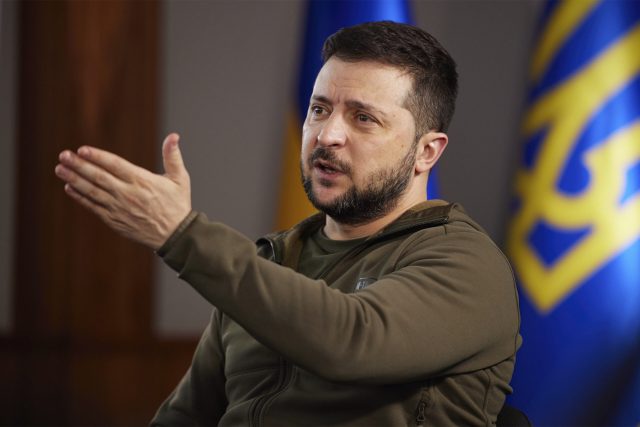
Zelensky also made clear that he would not hold negotiations with the current Russian leadership. He even signed a decree specifying that Ukraine would only negotiate with a Russian president who has succeeded Vladimir Putin.
These defiant declarations caused much irritation in Washington. The Washington Post revealed that US officials have warned the Ukrainian government in private that “Ukraine fatigue” among allies could worsen if Kyiv continues not to negotiate with Putin.
Officials have warned that Ukraine’s position on negotiations with Russia is wearing thin among allies who are worried about the economic effects of a protracted war.
In his speeches in Kyiv and Warsaw, Biden reiterated the well-known mantra that the US would support Ukraine “for as long as it takes”. However, allies in parts of Europe, not to speak of Africa and Latin America, are increasingly alarmed by the strain that the war is putting on energy and food prices as well as supply chains. “Ukraine fatigue is a real thing for some of our partners,” one US official said.
Naturally, the Americans cannot publicly admit to putting pressure on Zelensky. On the contrary, they maintain an appearance of firm solidarity with Kyiv. But in reality, serious cracks are appearing underneath the façade.
For the Ukrainian leadership, acceptance of negotiations would mean a humiliating retreat after so many months of belligerent rhetoric about the need for a decisive military victory over Russia in order to secure Ukraine’s security in the long term.
A string of successes on the battlefield in 2022, first in the north-east Kharkiv region and then with the seizure of Kherson, encouraged Zelensky to believe in the possibility of a “final victory”. But the Americans have a better grasp of reality and they know very well that time is not necessarily on the side of Ukraine.
Is Putin in danger of being overthrown?
The western propaganda machine constantly repeats the line that Putin will soon be overthrown by the Russian people, who are tired of the war. But that is mere wishful thinking. It is based on a fundamental misconception. At the present moment, Putin still has quite a wide base of support. He is not in any immediate danger of overthrow.
There is no significant anti-war movement in Russia at present and what there is is led and directed by the bourgeois-liberal elements. That is precisely its main weakness. The workers take one look at the pro-western credentials of these elements, and turn away, cursing.
The war has the general support of the majority of Russians, especially the workers, even if there is not much enthusiasm for it. The imposition of sanctions and the constant stream of anti-Russian propaganda in the West, and the fact that NATO and the Americans are supplying modern weapons to Ukraine, confirms the suspicion that Russia is being besieged by its enemies.
The only pressure on Putin comes, not from any anti-war movement, but on the contrary, from the Russian nationalists and others who want the war to be pursued with greater force and determination. However, if the war drags on for any length of time without significant proof of a Russian military success, that can change.
A significant symptom is the protests of the mothers of soldiers killed in Ukraine. These are still small in size and mainly concentrated in eastern Republics like Dagestan, where high levels of unemployment meant that large numbers of young men volunteered for the army. If the present conflict is prolonged, these could be multiplied on a far bigger scale, posing a threat, not just to the war, but to the regime itself.
If the number of deaths increase, we may see protests of mothers in Moscow and Petersburg, which Putin cannot ignore and would be unable to repress. This would undoubtedly mark a change in the whole situation. But it has not materialised – yet.
Russia’s war aims
The declared aim of Russia was to prevent Ukraine joining NATO, and to “demilitarise and de-nazify” the country. Also, at the outset Putin wanted a neutral or pro-Russian government in Kyiv.
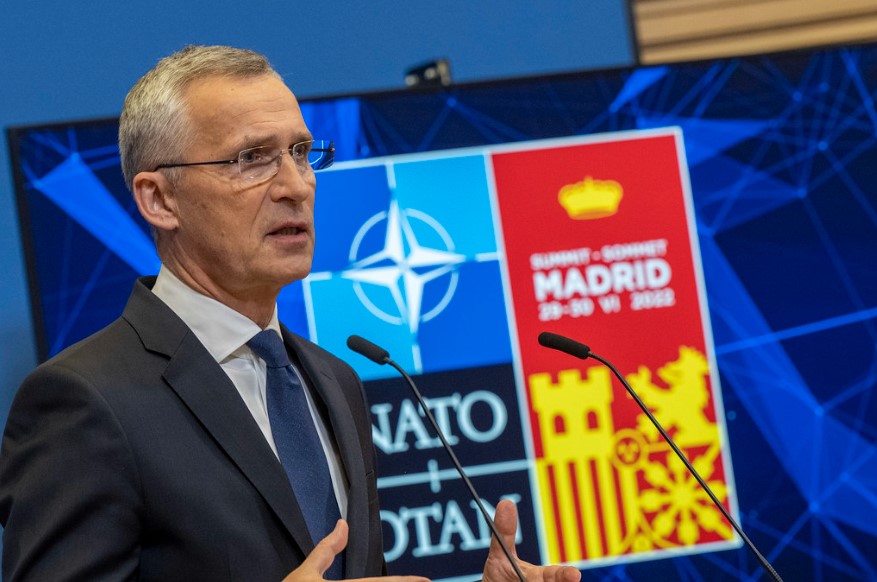
Putin clearly miscalculated in the beginning, and the Russians did not have sufficient forces to achieve these aims. Even the task of holding on to their gains in Donbas proved to be difficult, a fact that was clearly shown by the Ukrainian offensive in early September last year.
But the failures at the front acted as the necessary stimulus to readjust. They took steps to mobilise the forces needed to do what is necessary. Russia is carrying out a mass mobilisation. The dispatch of a reported 300,000 fresh Russian troops to the front will dramatically change the balance of forces.
The frequently repeated argument that the Russians are running short of ammunition is entirely false. Russia has a large and powerful arms industry. They have very considerable stocks of arms and ammunition.
It is not Russia but the Ukrainians and their imperialist backers who are running out of ammunition. The US and its allies have already sent nearly $50 billion in aid and equipment to Ukraine’s military in the past year alone. But the Ukrainians are using up their supplies far faster than they can be replaced.
NATO Secretary Jens Stoltenberg had to admit in the most recent NATO meeting that both Ukraine and NATO are in danger of running out of ammunition and spare parts for heavy weapons. He said that Western allies needed to stock up their own armouries while ensuring Kyiv received the weapons it needed “to win this war”:
“We see no signs that President Putin is preparing for peace,” Stoltenberg said. “What we see is the opposite, he is preparing for more war, for new offensives and new attacks.
“This has become a grinding war of attrition and therefore it’s also a battle of logistics.
“This is a huge effort by allies to actually be able to get in the ammunition, the fuel, the spare parts, which are needed.”
These admissions stand all the stupid propaganda that has been repeated for many months on its head.
Meanwhile, the Russians continue to pulverise targets all over Ukraine with artillery, rockets, drones and missiles; destroying military command centres, transportation hubs and infrastructure, which will seriously hamper the movement of troops and arms to the front.
World relations
The war in Ukraine cannot be seen in isolation. The world order (or more accurately, the world disorder) that has existed for the past 30 years following the collapse of the USSR, is drawing to a close.
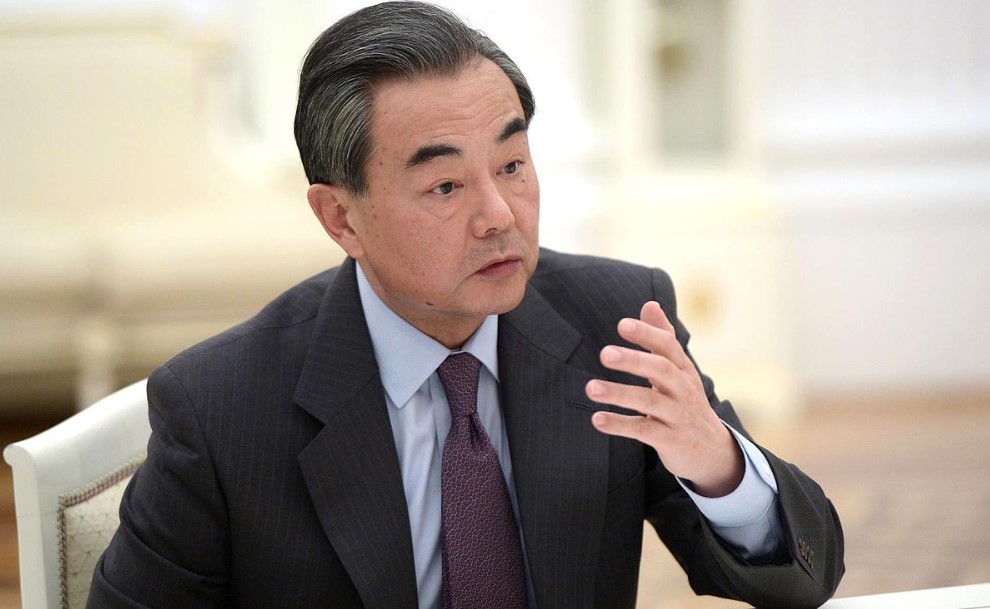
US imperialism is attempting to assert its role as the dominant world power. But it is meeting with resistance. Russia is contesting the US-led security order in Europe, while China is challenging it in Asia.
China has also drawn much closer to Russia, as both are in competition with US imperialism. China has recently warned western countries against “adding fuel to the fire” in Ukraine and reiterated calls for peace talks ahead of an expected visit to Moscow by Beijing’s most senior diplomat Wang Yi.
These remarks were interpreted in Washington as a threat that China might supply Russia with arms. The US issued an angry warning to Beijing that this would have serious consequences. That in turn met with an even angrier response from Beijing. Why should America and its allies have free rein to send massive supplies of arms to Ukraine but forbid China to send arms to Russia?
A very good question, to which we are still waiting for a very good answer.
A geopolitical transition has begun, resembling the shifts in the tectonic plates on the earth’s surface. And like the latter, it will produce earthquakes.
From the ashes of the old order, a new balance of power will eventually emerge. But this will take time to define itself and it will not be accomplished easily or peacefully. A new period of turbulence and upheaval has begun.
Although a world war is ruled out under present conditions, there will be many “small” wars and proxy wars like the one in Ukraine. This will add to the general volatility and add fuel to the flames of world disorder.
USA and Europe
In Europe, the USA is using the conflict in Ukraine to pursue its aim to force the Europeans to cut their ties with Russia, and thus strengthen the vice-like grip of US imperialism over the whole continent.
Prior to this, the German ruling class was, in effect, using its links with Russia as leverage to secure at least a partial independence vis-à-vis the USA.
Its other main lever was its de facto domination of the European Union, which it hoped to build up as an alternative power bloc, capable of pursuing its own aims and interests on a global stage.
Beneath the appearance of ‘western unity’, there are growing tensions between the USA and Europe, which have actually been exacerbated by this war. These tensions have resurfaced in the recent protectionist infrastructure bill by the US, which puts additional pressure on the industrial production in the EU.
US tensions with Europe are not new. They surfaced during the Iraq War, and more recently over relations with Iran. The leaders of France and Germany were always suspicious of America’s close relations with Britain, which they rightly regarded as an American Trojan Horse inside the European camp.
The French, who never concealed their own ambitions to dominate Europe, were traditionally more vocal in their anti-American rhetoric. The Germans, who are the real masters of Europe, were more circumspect, preferring the reality of power to empty boasting.
The Americans were not deceived. They saw Germany, not France, as their main rival, and Trump in particular made no secret of his extreme distrust and dislike of Berlin.
In order to secure their independence from Washington, the German capitalists entered into a close relationship with Moscow. This enraged their ‘allies’ across the Atlantic, but gave them considerable benefits in the form of cheap and plentiful supplies of oil and gas.
Being deprived of these supplies is a very high price to pay for keeping the Americans happy. Under Angela Merkel, Germany jealously preserved its independent role. It required a war in Ukraine to make Germany fall into line – at least for the time being.
For the time being, the USA has succeeded in using the war to tighten its grip on Europe. But it is not at all clear how long the patience of the Germans and other Europeans will last. The contradictions generated by this situation will only become clear when the Ukrainian business is settled.
What victory?
In the present war, above all, it is a mistake to talk of either a Russian or a Ukrainian victory. It is first necessary to define what victory means.
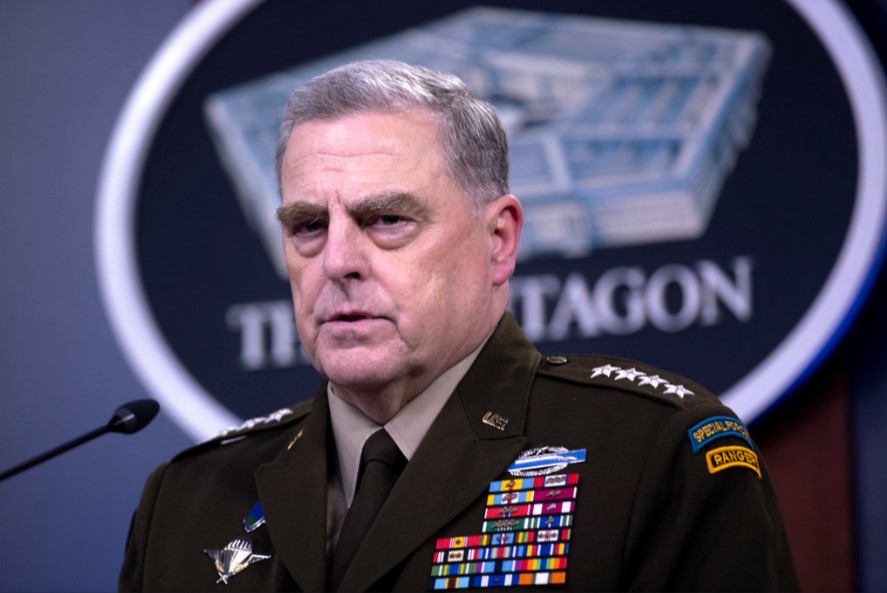
From the Ukrainian side, the answer is simple: to bring about the military defeat of Russia and compel the withdrawal of Russian forces from all occupied territories, including Crimea. But although it may seem simple, most military experts agree that it is an aim that is vanishingly improbable.
For Russia, things are even simpler. In theory, Putin could claim victory if Russia manages to take control of all of the Donbas and the land bridge to Crimea. But he would certainly like more, for example, to take Odesa and the Black Sea coast.
That would strangle Ukraine economically, and reduce it to a state of vassalage. It would be a crushing blow to NATO and would expose the limits of US power. Naturally, the Americans will do everything in their power to prevent that. But it is far from certain that they can succeed.
Biden has just announced more aid for Ukraine. But it will not be enough to turn the tide of the war, which is now flowing in Russia’s direction. What Washington wants is to continue supplying sufficient weapons to keep the conflict in Ukraine going, and thereby undermine Russia.
Despite all the public show of bravado, however, the serious military strategists have understood that it is impossible for Ukraine to defeat Russia. General Mark A. Milley is the 20th Chairman of the Joint Chiefs of Staff, the USA’s highest-ranking military officer. His opinions must therefore be taken very seriously when he says:
“So, in terms of probability, the probability of a Ukrainian military victory defined as kicking the Russians out of all of Ukraine to include what they define or what the claim is Crimea, to – the probability of that happening anytime soon is not high, militarily.”
The imperialists continue to play their macabre game. They are stoking the fires of war, sufficiently to keep them burning, but without providing the Ukrainians with the necessary wherewithal to win.
The fact that this scenario inevitably means the most appalling destruction, misery, death and suffering for countless people is a matter of complete indifference to them. But there are limits to all things.
Unlike the imperialist hypocrites, the working class in the West feels genuine sympathy for the terrible suffering of millions of poor people in Ukraine. They donate money, clothes and food, which they cannot afford, to help the victims of war. They effortlessly open their houses and share whatever they have with homeless refugees. And this is to their credit.
But it is one thing to express solidarity with the victims of war. And it is another thing altogether different to support, directly or indirectly, the cynical policy of imperialism, which is exploiting the misery of millions of men, women and children to deliberately prolong the conflict for its own selfish interests.
Nuclear war?
The one really new element in Putin’s recent speech was his announcement of the suspension of Russia’s participation in talks on a nuclear arms control treaty. He further announced that new strategic systems had been put on combat duty, and threatened to resume nuclear tests if the USA started first.
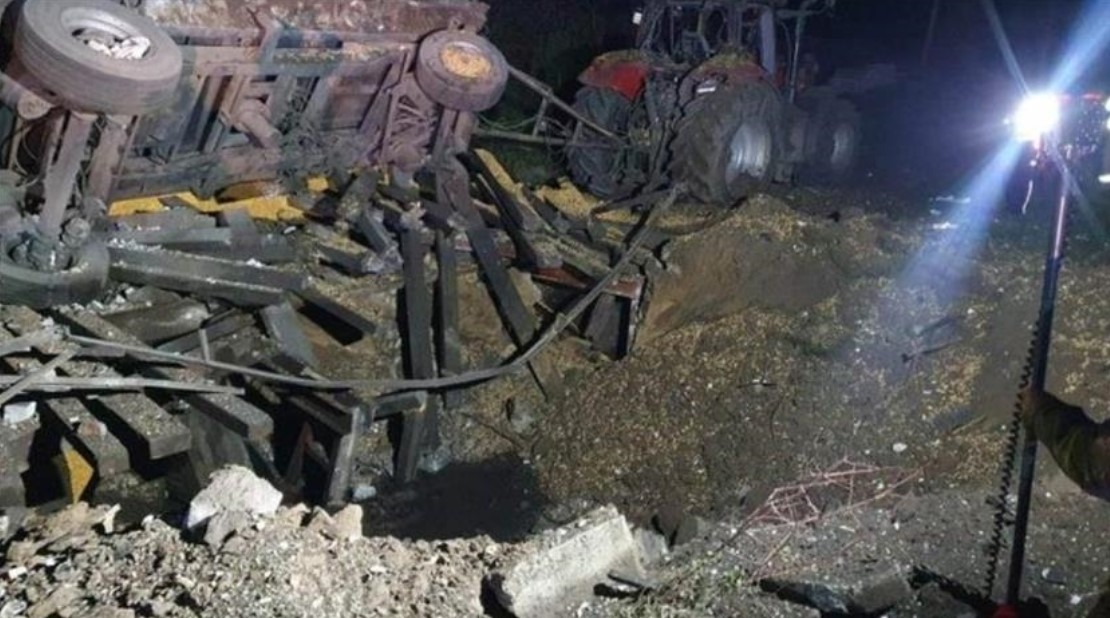
Putin’s hint that he might consider using nuclear weapons was almost certainly a bluff, but his words immediately started alarm bells ringing in Washington and Brussels. The countenance of Stoltenberg, the flint-faced Norwegian who likes to call himself the General Secretary of NATO, for once betrayed some faint signs of emotion over Putin’s declarations.
Whatever the Americans’ intentions are, an actual war with Russia does not figure among them. A direct confrontation between NATO and Russia, with all its nuclear implications, will be avoided by both sides at all costs.
The Americans have no intention of letting things go that far. It is precisely for this reason that the Americans have several channels open with Russia, in order to avert any chance of uncontrolled events that can lead to undesirable developments.
All this will give added weight to the efforts of men like Joint Chiefs Chair general Mark Milley to put pressure on Zelensky to begin talks with Russia. But this is the kiss of death from the Ukrainian point of view.
“When there’s an opportunity to negotiate, when peace can be achieved, seize it,” Milley said. “Seize the moment.”
But if negotiations never materialise or fail, Milley says the United States would continue to arm Ukraine, even as outright military victory for either side looks increasingly unlikely.
“There has to be a mutual recognition that military victory is probably in the true sense of the word maybe not achievable through military means, and therefore you need to turn to other means,” he said. This is a clear warning to Zelensky that the continued support of US imperialism cannot be taken for granted. And this, not the rhetorical declarations of Joe Biden in Kyiv and Warsaw, is what will ultimately determine the fate of Ukraine.
There are, in fact, definite limits to the willingness of the US to continue to foot the bill for an expensive war with no clear end in sight. Washington has always been reluctant about supplying Kyiv with the kind of advanced weaponry it has been requesting.
This is intended to send a signal to Moscow that the US is unwilling to provide weapons that could escalate the conflict, creating the potential for a direct military clash between Russia and NATO.
This underlines the dangers that are implicit if the war is allowed to continue. There are too many uncontrollable elements in play, which might give rise to the kind of downward spiral that could lead to a real war between NATO and Russia.
The danger of such developments was underlined in November 2022, when the world was shocked to hear the Polish president’s statement that his country had been hit by Russian-made missiles, with western media claiming that Russia was behind it.
That lie was soon exposed when it was revealed by the Pentagon itself that the missile that hit a Polish grain facility at a farm near the village of Przewodow, close to the border with Ukraine, was fired by the Ukrainian army.
NATO and the Poles hastened to explain that it was all “a regrettable accident”. But despite the missile being an S-300 anti-air missile with very limited range, which could hardly have been fired from Russia, Zelensky blatantly lied and insisted it was a deliberate attack from Russia.
He hoped it would have given him a powerful lever to demand more arms and money. And in the best-case scenario (from his point of view) it might push NATO into taking retaliatory measures against Russia, with interesting consequences.
If that incident had served to push NATO into action against Russia, it could have sparked off an unstoppable chain of events that might have led to all-out war. There is no doubt whatsoever that it would suit Zelensky very well to see NATO enter the war and thus pull his hot chestnuts out of the fire.
A general European conflagration would have been a nightmare for millions of people. But for Zelensky and his clique it would have been the answer to all their prayers. It would naturally be impossible for the Americans to stand on the sidelines, warming their hands on the flames.
There would have to be American troops on the ground. Excellent news from the standpoint of the Kyiv regime, but not at all from that of the White House and the Pentagon. That was not supposed to be part of the script!
The prospect of a new Russian offensive fills the men in Kyiv with alarm. This explains the recent intensification of Zelensky’s diplomatic offensive: the sudden trips to London and Washington, and Biden’s melodramatic appearances in Kyiv and Warsaw.
Zelensky is a desperate man. And desperate men do desperate things. There are clearly elements in the Ukrainian army and secret services who are looking for any excuse to stage a provocation that they hoped would finally drag NATO into direct participation in the war.
The incident of the missile fired at Polish territory by a Ukrainian army unit was a case in point. There is every reason to believe that new, and even more serious provocations are being hatched in Kyiv right now.
Yesterday, Russia claimed Ukraine was ramping up efforts to invade Transnistria, Moldova’s Moscow-backed separatist region, and pledged a “response.” That is entirely possible. Whether it materialises or not, it is entirely predictable that some new provocation].
Whether this can succeed is another matter altogether.
What now?
Napoleon’s saying that war is the most complex of all equations retains its full force. War is a moving picture with many unforeseeable variants and possible scenarios.
The variant that has been confidently advanced by the western propaganda machine ever since the commencement of hostilities appeared to be validated by the success of the Ukrainian offensive in September 2022, and later by the Russian withdrawal from the western part of Kherson.
However, we must guard against impressionistic conclusions drawn from a limited number of events. The outcome of wars is rarely decided by a single battle – or even by several battles.
The question is: did this victory, or that advance, materially alter the underlying balance of forces, which alone can determine the final result? These fundamental questions have yet to be determined. Different outcomes are possible, depending on how conditions develop both in Russia on the one hand, and Ukraine and its western masters on the other.
Russia has been building up its forces in the east, strengthening its military presence in Belarus, and intensifying its aerial bombardment of both military targets and the already weakened Ukrainian infrastructure.
Thus far, the Ukrainians have shown a remarkable level of resilience. But how long the morale of both the civilian population and the soldiers at the front can be maintained is unclear.
One thing is clear, however. The next Russian offensive will not be like the previous one that failed so ignominiously. The Russians will attack with all the numbers and firepower at their disposal. And it seems most unlikely that the Ukrainians, already severely weakened by heavy losses and the destruction of their infrastructure, will be able to resist.
However, that does not signify an end to hostilities. In order to secure a total victory, the Russians will have to go much further, until they have utterly undermined the fighting capacity of the Ukrainian army. Is this possible? Yes, it is possible. Russia has considerable reserves that have not yet been brought into play, and which Ukraine lacks. But it will be neither easy nor quick.
News of serious reverses at the front will have an effect on morale. Eventually, splits will break out in the leading layer in Kyiv between the right-wing nationalists, who wish to fight to the bitter end, and the more pragmatic elements, who see that further resistance will only lead to the total destruction of Ukraine and that some kind of negotiated settlement is the only way out.
Whatever the result, there can be no question of a return to the status quo in Europe. A new period of extreme instability, wars, civil wars, revolution and counterrevolution has been born.
London
24 February 2023

